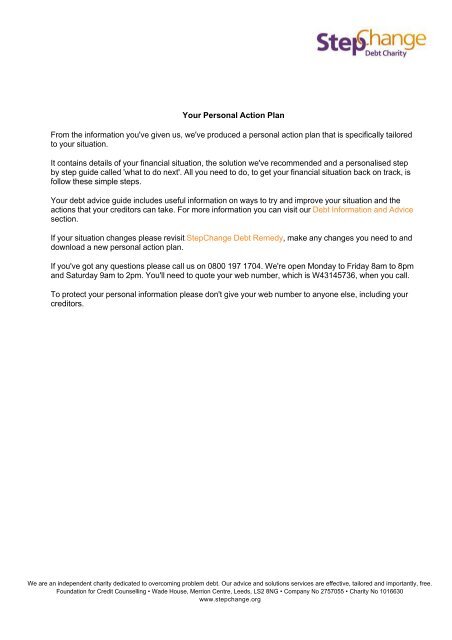You also want an ePaper? Increase the reach of your titles
YUMPU automatically turns print PDFs into web optimized ePapers that Google loves.
Your Personal Action Plan<br />
From the information you've given us, we've produced a personal action plan that is specifically tailored<br />
to your situation.<br />
It contains details of your financial situation, the solution we've recommended and a personalised step<br />
by step guide called 'what to do next'. All you need to do, to get your financial situation back on track, is<br />
follow these simple steps.<br />
Your debt advice guide includes useful information on ways to try and improve your situation and the<br />
actions that your creditors can take. For more information you can visit our <strong>Debt</strong> Information and Advice<br />
section.<br />
If your situation changes please revisit StepChange <strong>Debt</strong> <strong>Remedy</strong>, make any changes you need to and<br />
download a new personal action plan.<br />
If you've got any questions please call us on 0800 197 1704. We're open Monday to Friday 8am to 8pm<br />
and Saturday 9am to 2pm. You'll need to quote your web number, which is W43145736, when you call.<br />
To protect your personal information please don't give your web number to anyone else, including your<br />
creditors.<br />
We are an independent charity dedicated to overcoming problem debt. Our advice and solutions services are effective, tailored and importantly, free.<br />
Foundation for Credit Counselling • Wade House, Merrion Centre, Leeds, LS2 8NG • Company No 2757055 • Charity No 1016630<br />
www.stepchange.org
Section 1<br />
Your financial situation<br />
This shows the information you have given us<br />
Section 2<br />
Your debt solution<br />
Everything you need to know about making your monthly payment<br />
Your debt advice guide<br />
This guide provides practical advice that will give you useful ideas on how to<br />
improve your situation and how to handle your creditors.
Section 1<br />
Your financial situation<br />
Your financial summary<br />
Monthly income<br />
The total of all money you receive in a 'calendar<br />
month'*.<br />
£657<br />
Monthly outgoings<br />
The total of all household spending in a 'calendar<br />
month' including payments to any 'secured' debts and<br />
all priority household bills.<br />
£569<br />
Monthly contractual payments<br />
The balances on your unsecured debts have been<br />
used to work out the amount of money you’d need to<br />
make your minimum payments each month.<br />
£34<br />
Total number of creditors<br />
The number of unsecured debts you need to pay each<br />
month.<br />
1<br />
Total unsecured debt<br />
The amount you owe your creditors for all unsecured<br />
debt.<br />
£664<br />
Once you have paid your priority household bills, you have £88 available each month.<br />
*Calendar monthly means that we have calculated the amount into a yearly figure and then divided by<br />
twelve.
Section 1<br />
Your financial situation<br />
Your budget<br />
Housing Amount Comments<br />
Rent £380<br />
Mortgage<br />
Secured loans<br />
Charging / Inhibition order<br />
Mortgage endowment premium<br />
Service charge/ground rent<br />
Water<br />
Council tax £50<br />
Gas<br />
Electricity<br />
Other household fuels<br />
Household Services<br />
Building/contents insurance<br />
Telephone/mobile/internet<br />
TV licence<br />
Satellite/cable television<br />
Repairs/maintenance<br />
Household appliance rental<br />
Child maintenance<br />
Childcare<br />
Fines/CCJs/decrees<br />
Life insurance/pensions<br />
Medical/accident insurance<br />
Hire purchase<br />
Amount Comments<br />
Transport Amount Comments<br />
Spares/servicing<br />
Road tax<br />
Insurance<br />
Breakdown cover<br />
Fuel/parking<br />
Public transport<br />
Food & Housekeeping Amount Comments<br />
Food, toiletries, cleaning<br />
£50 Reduced to pay priorities<br />
School meals/meals at work<br />
Pets/pet foods/insurance<br />
Tobacco<br />
Misc. Goods & Services Amount Comments<br />
School trips/activities<br />
Medicine/prescriptions<br />
Dentist/opticians<br />
Hairdressing<br />
Union/professional fees<br />
Laundry/cleaning<br />
Education fees<br />
Personal & Leisure Amount Comments<br />
Clothing/footwear £5<br />
Newspaper/magazines<br />
Sports/hobbies/entertainment<br />
Children's pocket money<br />
Religious contributions<br />
Sundries & Emergencies Amount Comments<br />
Sundries/emergencies £35<br />
Loan from family/friends £49 Fair amount based on outstanding balance of £380.00<br />
About You<br />
Details<br />
Date budget created 20 Aug 2014<br />
No of adults 3<br />
No of dependants 0<br />
Your Income<br />
Take home pay<br />
Partner's take home pay<br />
Rent/board received<br />
Amount<br />
Pension received £657<br />
Any other income received<br />
Income Support<br />
Jobseekers Allowance<br />
Incapacity Benefit/ESA<br />
DLA/PIP<br />
Working Tax Credit<br />
Child Benefit<br />
Child Tax Credit<br />
Child Support<br />
Total Income £657<br />
Total Expenditure £569<br />
Surplus (Deficit) £88<br />
Budget Comments<br />
Please note: Payments are not being<br />
administered by StepChange <strong>Debt</strong> Charity.<br />
This budget was created online using StepChange <strong>Debt</strong> <strong>Remedy</strong>
Section 1<br />
Your financial situation<br />
List of creditors<br />
Creditor Name <strong>Debt</strong> Type Outstanding Balance Contractual Payment Ownership of <strong>Debt</strong><br />
building society Overdraft £664 £34 Me<br />
TOTAL<br />
£664<br />
TOTAL<br />
£34
Section 2<br />
Your debt solution<br />
Monthly payment arrangement<br />
Your financial summary shows that you can afford to make your payments to your unsecured debts<br />
(loans, credit cards etc). These add up to a total of £664 and you can afford to pay them £88 each<br />
month.<br />
About making a monthly payment arrangement<br />
It may mean a few changes to your spending but the amount you have left over after paying for all your<br />
household priorities, means that you will be able to make a monthly payment arrangement with your<br />
creditors to pay off your debt, even if you are in arrears with them.<br />
Your first priority is to clear any arrears and debts which are over limit, such as your overdraft or credit<br />
cards. This will mean that you will start to reduce the interest charges and over limit fees you are paying.<br />
Once you have done this, look into ways to clear the rest of your debt as soon as possible.<br />
Paying the debt off early saves you money. This is because when you reduce the time to pay off your<br />
debt, you also reduce the amount of interest and other charges which you would normally pay if you were<br />
only making the minimum payments.<br />
How this works<br />
When you are able to meet your monthly payments it is very unlikely that your creditors will stop interest<br />
or other account charges.<br />
Try and make an acceptable arrangement with the creditors whose debts you are in arrears with by<br />
paying them more than your normal monthly repayment. Once you have made an arrangement, stick to it<br />
and never agree to pay more than you can afford otherwise you will get further behind with your other<br />
debts or priorities.<br />
Once you have done this you should consider reducing or paying all your debts off as soon as possible<br />
by continuing to pay your creditors whatever you can afford extra each month.<br />
Also, shop around to see if you can use different loans and credit cards which offer cheaper rates of<br />
interest. But don't use these to borrow any more new money and always carefully check the terms of the<br />
new agreement before signing.<br />
Never be tempted into taking out a large consolidation loan to repay your debts and then start using the<br />
existing limits to build up even more debt. Once you have paid your debts off, cancel the agreements<br />
and destroy any cards.<br />
To help you find the best way of reducing or paying your debts off, take a look at some trusted<br />
comparison websites such as www.moneysavingexpert.com or speak to an independent financial<br />
advisor.<br />
If your credit rating is already affected, you may not be able to get cheaper credit so just continue<br />
making the extra monthly payments.<br />
Things to consider
Section 2<br />
Your debt solution<br />
If you are finding it difficult to stay within your overdraft limit and you cannot easily reduce your balance,<br />
you need to consider using another bank account.<br />
Treat the overdraft as any normal unsecured debt and pay off the outstanding balance at the amount<br />
shown on the list of creditors.
Section 2<br />
Your debt solution<br />
What to do next<br />
Resume paying the monthly contractual payment to your creditors. Check<br />
that the information in your budget and creditors list is accurate. Make life easier<br />
for yourself by paying your creditors using the best available method, for example<br />
set up a Direct Debit.<br />
Contact your creditors. If you are behind with your payments, clear arrears by<br />
paying more than your normal monthly amount. You need to tell your creditors how<br />
you intend to deal with any arrears. Stick to the arrangement by paying the extra<br />
money at the same time as your normal payment each month and don't be<br />
pressured into giving them more than you can afford.<br />
Clear your remaining debt by paying extra money to each of your creditors every<br />
month. As you pay each debt off, use the money which you used to pay them to<br />
clear all your other remaining creditors more quickly.<br />
Check the other information in 'Your debt advice guide' for other ideas on<br />
how to improve your situation by reducing your expenditure and increasing your<br />
income.
Section 2<br />
Your debt solution<br />
We also recommend you<br />
The information you've just read advises you on the best way to deal with your debts. We also<br />
recommend you look at ways to increase your income and reduce your spending.<br />
Please read 'Your debt advice guide' for ideas on this. In the meantime, here are a few ideas to help<br />
you get started:<br />
Make sure the other adults in your household are contributing as much as they can to your<br />
household income. It is important that they contribute towards their cost of living even if they are only on<br />
a low income. For example, towards:<br />
●<br />
●<br />
●<br />
●<br />
●<br />
Mortgage or rent<br />
Council Tax<br />
Gas, Electricity and Water<br />
Food and clothing<br />
Transport<br />
This will help you to improve your situation and may mean that you can repay your debts quicker.<br />
Visit our online StepChange Wellbeing service.<br />
Financial difficulty can often affect your personal wellbeing. We think you could benefit from some further<br />
advice as the information you have given shows us you are displaying signs of depression and anxiety.<br />
You can access this service at www.stepchange.org/wellbeing using web number, W43145736.<br />
Keep up with payments to your priority household bills such as your mortgage or rent, council tax,<br />
and utilities (gas, electric and water). If you do not, there are consequences. These are listed in 'Your<br />
debt advice guide'. Please refer to the section titled, 'What to pay first' to find out more.<br />
Change your bank account as your overdraft is included in your list of creditors. Your bank can take<br />
money from your account to clear the overdraft and remove your facility. Open a basic bank account<br />
where you do not have any unsecured debts. Make sure you have the new account open before telling<br />
your existing bank and remember to switch your essential direct debits for household bills.<br />
A list of alternative bank accounts can be found at www.moneyadviceservice.org.uk.<br />
Talk to the friend or family member that you owe money to. We recommend that you pay them<br />
£49 a month. This amount is based on how much you owe to them, how much you owe to your<br />
unsecured debt and the amount of money you have available each month. By doing this we can make<br />
sure you're paying a fair amount back to everyone you owe money to. If you've spoken to your friend or<br />
family member and you can't pay them the amount we've recommended please call us on 0800 197<br />
1704 and we can discuss your options.<br />
Tell your partner about your financial difficulties if you feel able to. This may avoid future problems or<br />
relieve stress by sharing your worries.
Your debt advice guide
Whatever your debt<br />
problem, we can help<br />
We are the UK’s leading debt charity. Every year, we help thousands of people<br />
overcome their debt problems.<br />
Because we are a charity, our advice is completely free. Many debt management<br />
companies charge for their services or conceal how they make profits from<br />
handling your debt problem. When you deal with StepChange <strong>Debt</strong> Charity,<br />
however, you can be assured that you’re taking advice from a trusted and<br />
impartial source.<br />
No matter how serious your situation, we will always provide the help and support<br />
you need. We will consider all the options available to you and recommend the<br />
best course of action to solve your financial problems.<br />
Take control of<br />
your finances<br />
You are<br />
not alone –<br />
we’re here<br />
to help you<br />
When debts get out of control, it’s often difficult to know<br />
where to turn. Worry and stress can make it difficult to<br />
think clearly and make the right decisions. That’s why<br />
we’re here to provide the expert and impartial advice<br />
that you need.<br />
You might owe money to lots of different companies.<br />
They might be banks, loan companies, energy<br />
companies – maybe all pursuing you for money at the<br />
same time. They might even be threatening you with<br />
legal action. But being in debt is not illegal. And you<br />
should never feel pressured into repaying more than<br />
you can afford.<br />
The important thing is not to panic or bury your head in<br />
the sand. There is a way out of this. And we can help.
Whatever your debt<br />
problem, we can help / cont.<br />
Your next step?<br />
Just follow our advice<br />
By contacting StepChange <strong>Debt</strong> Charity,<br />
you’ve already taken the first important step<br />
in your financial recovery. Your next step is to<br />
follow the advice that we have provided in<br />
this pack.<br />
This guide gives you general advice and tips<br />
on dealing with debt problems and managing<br />
your money. But the personal action plan that<br />
we’ve enclosed gives you specific advice<br />
that’s tailored to your situation. It gives you a<br />
complete summary of your financial position<br />
now and the actions you need to take to<br />
improve things.<br />
Please take time to read your personal action<br />
plan carefully, and, where we have outlined<br />
actions to take, try to take them.<br />
Some other steps<br />
to take:<br />
Stay calm and think things through<br />
<strong>Debt</strong> problems are never solved overnight. Take time<br />
to sort things out. Just by contacting us and reading<br />
through our advice, you will be able to clear your head<br />
and organise your thoughts. Remember, if you need<br />
further help, we’re here to support you.<br />
Share your problems<br />
If you feel that you can, consider sharing your problem<br />
with someone who’s close to you. Talking about it may<br />
relieve a lot of stress. It may also help you work things<br />
out and give you more practical ideas about dealing<br />
with debt.<br />
Don’t borrow more money by:
Improving your<br />
financial situation<br />
Within this pack, we’ve given you tailored advice to help you with your current<br />
financial problems. But there are many things that you can do to make sure that<br />
your spending and income are better balanced. Tighter budgeting and being<br />
more disciplined in the way that you manage your money will bring long-term<br />
benefits, too.<br />
Reducing your spending<br />
If you’re already cutting back on your spending,<br />
you’re doing the right thing. But could you do<br />
more? We may have highlighted areas where<br />
you can look to save money. Here, though, are<br />
some general points to consider. If you haven’t<br />
already made a conscious effort to reduce your<br />
spending, now’s the time to do it.<br />
Shopping<br />
If you plan your shopping and work to a budget, you are<br />
less likely to make impulse buys or spend more than you<br />
want to.<br />
• You should never cut back on essential food items.<br />
But are there cheaper brands or supermarket<br />
own-label brands that offer better value?<br />
• Consider switching to a cheaper supermarket<br />
• Look out for special offers, keep coupons and<br />
remember to use them<br />
• There might be reduced grocery items available at the<br />
end of the supermarket day. Could you take advantage<br />
of that?<br />
• Use a shopping list and stick to it.<br />
Utilities<br />
Gas and electricity<br />
Are you getting the best deal on your gas or electricity?<br />
It might be that by switching your current provider, you<br />
could reduce your bills. Go online to see what’s possible.<br />
You can compare, switch and save using our free and<br />
impartial switching service at<br />
www.stepchange.org/utility-switching<br />
If you stay with your current provider, there are other<br />
ways you could save money. Most companies offer a<br />
discount for paying by direct debit.<br />
Or if you have gas and electricity from the same supplier,<br />
you could get a dual-fuel discount. Contact your supplier<br />
to see if that’s available to you.<br />
Maybe you can reduce your energy consumption.<br />
There are many ways you can do this, such as using loft<br />
and cavity wall insulation. There might be free offers<br />
available. Visit www.energysavingtrust.org.uk or call<br />
them on 0800 512 012.<br />
Water<br />
If you are a low water user, it might be cheaper to have<br />
a water meter fitted. There are also water saving devices<br />
that can be used in the home. Contact your water<br />
company to find out more.
Improving your<br />
financial situation / cont.<br />
We have helped<br />
to change the<br />
lives of over two<br />
million people<br />
Telephone, satellite and internet<br />
These bills can really add up. So it’s really worth<br />
reviewing the package that you are on to make sure<br />
that it offers the best value available. Check with your<br />
current provider, shop around or use comparison sites.<br />
Here are a few ideas for cutting costs:<br />
<br />
package. Bundling all three together usually results<br />
in a better deal.<br />
<br />
If you can live without those extra TV channels,<br />
for example, you can make substantial savings.<br />
<br />
a pay-as-you-go phone. With a pay-as-you-go<br />
phone, you can control how much you spend<br />
more easily.<br />
Housing<br />
One of your biggest monthly bills is likely to be<br />
your mortgage or rent. Moving home is probably<br />
a last resort, but if you think it is possible, consider<br />
downsizing or moving to a cheaper property.<br />
Increasing your<br />
income<br />
When times are difficult, finding ways to boost your<br />
income is not an easy task. But if you’re able to work,<br />
don’t give up. Keep looking for opportunities that could<br />
improve your situation. If you’re already in work, could<br />
you increase your hours or take on a second job?<br />
A few other things to consider<br />
<br />
<br />
<br />
share the bills
Tackling your debt<br />
Ideally, everyone who borrows money should do everything they can to repay it.<br />
Sometimes though, the situation can be so severe that repaying the full amount<br />
simply isn’t possible. Whatever your circumstances, we’re here to do what’s best<br />
for you. We work out what you can afford and, where necessary, mediate with<br />
creditors on your behalf. There are some actions, however, that you need to take<br />
which should take priority. So check your personal action plan and follow our<br />
advice below.<br />
What to pay first<br />
When tackling debt, it’s important to know<br />
which debts you should pay first. Priority debts<br />
are the ones that carry the most serious<br />
consequences if not paid. It’s not the size of<br />
the debt that’s the most significant factor here,<br />
but what can happen if you don’t pay, such as<br />
losing your home or losing essential services<br />
such as gas or electricity.<br />
The best way to deal with your priority<br />
creditors is to contact them, give details of<br />
your situation and tell them what you can<br />
afford to pay, based on the budget we’ve<br />
helped you prepare.
Tackling your debt / cont.<br />
Don’t be pressured<br />
to make higher<br />
payments than you<br />
<br />
Priority debts<br />
Mortgage<br />
Rent<br />
<br />
Council Tax or Rates<br />
Magistrates Court Fines<br />
Tax, VAT or National Insurance<br />
County Court Judgments<br />
Child Maintenance<br />
<br />
Gas, Electricity or Other Fuel<br />
Hire Purchase<br />
Telephone<br />
Result of non-payment<br />
<br />
A visit from bailiffs, deductions taken<br />
from your salary or imprisonment<br />
A fine, deductions taken from<br />
your salary or imprisonment<br />
<br />
Paying what you<br />
can afford<br />
Your budget shows to what extent you can<br />
manage day to day living costs and priority<br />
debts. What’s left over is what you can pay to<br />
your non-priority creditors.<br />
Do not use the money set aside for your<br />
priority household bills to pay your non-priority<br />
creditors. Falling behind with your mortgage<br />
has far more serious consequences than<br />
falling behind with your credit card.
Actions that<br />
creditors might take<br />
It’s only natural that your creditors will want to try to persuade you to continue<br />
or even increase your payments to them. By knowing your rights and<br />
responsibilities, you’ll be better prepared when they do contact you. And if<br />
there’s anything you’re unsure of, you can always call us for practical advice.<br />
If you are behind with your payments, your<br />
creditors might take a number of different<br />
actions to recover the money owed to them.<br />
You need to be prepared for the time when<br />
your creditors might increase pressure.<br />
Default notices<br />
Usually, if you are two to three months in arrears, your<br />
creditor will send you a default notice. (A default notice<br />
is the last chance you have to clear your arrears before<br />
they end the original credit agreement.)<br />
At this point you can still arrange to make a reduced<br />
payment. If they accept your offer, they are still likely<br />
to send you a letter ending the agreement. You are<br />
still responsible for paying the debt in full even if the<br />
original agreement has ended.<br />
When they have ended the agreement, your creditor<br />
can use a collection agency or solicitor to help them<br />
recover the debt.<br />
It’s not a<br />
crime to be<br />
in debt<br />
Actions solicitors and debt collection<br />
agencies might take<br />
If you receive a letter from a solicitor or debt collection<br />
agency, don’t panic, but don’t ignore it.<br />
Any letters that you receive might be threatening and<br />
mention court action. But don’t panic. Solicitors and<br />
collection agencies have no more legal powers than<br />
your original creditor to force you to pay.<br />
Home visits are rare. <strong>Debt</strong> collectors are not bailiffs, and<br />
you don’t have to let them into your home. In the rare<br />
event that a bailiff does call, you can still offer a reduced<br />
payment and show your budget and list of creditors.<br />
If you get a court letter, try not to worry. You can still offer<br />
to make a reduced payment to the creditor (based on<br />
what you can afford) by completing the details on the<br />
forms they send you. The creditor will then accept or<br />
reject the offer and work with the court to decide what<br />
payment you should make. If you need any further help,<br />
just give us a call on 08442 641 919 and we can talk you<br />
through what happens and what you should do.<br />
Harassment<br />
Creditors and their collection agencies are allowed to<br />
make reasonable contact to collect the debt owed by<br />
you. If they call or visit you at work or call late at night,<br />
this is harassment, and you can complain to trading<br />
standards. Their details can be obtained from<br />
www.tradingstandards.gov.uk.
Together, we can solve<br />
your debt problems<br />
We can help<br />
you out of debt<br />
When you face severe financial problems, it’s often difficult to see a way out.<br />
The best thing you can do is ask for help. With our support, and the vast<br />
experience we have in dealing with problems like yours, we can resolve issues<br />
that, at times, might seem impossible. We help thousands of people every<br />
<br />
meaningful than ours.<br />
“ It seemed so easy to get a loan<br />
here, a credit card there and<br />
instantly have money to spend.<br />
But very soon it built up to a level<br />
where I felt trapped. You helped<br />
me get my life back in order.”<br />
“ Even when I was<br />
overloaded with<br />
letters and phone<br />
calls from some of my<br />
creditors, your advice<br />
and assistance was<br />
all that was needed<br />
to return to the<br />
status quo. The whole<br />
service has been just<br />
fantastic.”<br />
“ The stress and anxiety of<br />
not being able to pay your<br />
creditors is unbelievable.<br />
But with your wonderful<br />
charity’s help, it seems we<br />
have been given a reprieve.”<br />
“ <strong>Debt</strong> hung over me<br />
like a dark shadow.<br />
But just knowing that<br />
I had you to support<br />
me made me feel<br />
much less anxious<br />
about everything.”<br />
“ Your professionalism, friendliness, expertise<br />
and understanding reassured me every<br />
time I called. You’re a superb team, and
“ After going through my budget with<br />
the advisor, I realised that with careful<br />
budgeting I could turn my life around<br />
and be debt-free quicker than I ever<br />
thought possible.”<br />
Your next steps<br />
Recognising that you’re in financial difficulty is the first<br />
step towards addressing problem debt. It’s also one of<br />
the hardest. By getting in touch with us you’ve already<br />
taken a huge stride towards a debt-free future. But what<br />
you do next is just as important.<br />
It’s only natural to feel a little daunted at the start of<br />
a journey like this. But we’ll be with you every step<br />
of the way. The personal action plan included in this<br />
pack is a great place to start. It’s tailored to your own<br />
circumstances, so there really is no better plan for what<br />
you need to do next. And if there’s anything you’re not<br />
sure of, just give us a call.<br />
For more information<br />
Call: 08442 641 919<br />
Monday to Friday 8am to 6pm<br />
Online: www.stepchange.org<br />
StepChange <strong>Debt</strong> Charity, Wade House,<br />
<br />
Visit our website where you can find even more valuable<br />
information and resources about debt and money in general.<br />
You can read our blog, follow us on Twitter or visit us on<br />
Facebook simply by following the links on the homepage.<br />
© 2012 Foundation for Credit Counselling<br />
Registered Office: Wade House, Merrion Centre,<br />
<br />
You can even sign up to our email newsletter where<br />
we send the latest information, stories and news direct<br />
to your inbox.<br />
Registered in England No 2757055<br />
Registered Charity No 1016630







